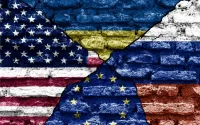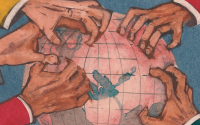18 January 2006Eric Tang
Chile has officially elected its first female president, Michelle Bachelet. Bachelet, a Minister of Defense under the current government and member of the Socialist Party, today defeated her opponent, the right-centrist billionaire Sebatian Pinera, with approximately 53% of the national vote in what was month-long, head-to-head, presidential run-off election. She was the candidate for the incumbent coalition, the Party for Democracy Alliance (also known as the Concertacion),
At approximately 7:15pm tonight, holding less than 47% of the national vote, Pinera conceded the election to Bachelet, bringing to a close what many in the Bachelet camp believe was a negative campaign that sought smear the president-elect on a range of "culture¨ and "values" issues. Bachelet, is a single mother of three who is long separated from her first partner (divorce is still not on the books in Chile). And she is openly agnostic in a country that is overwhelmingly Catholic.
But tonight she addresses the crowds lining downtown Santiago as the first democratically elected woman President in South America, and the only Latin American presidenta to win the seat without following in the footsteps of a beloved or martyred presidential husband.
Moreover, her victory comes on the heels of several other "firsts" for the region. December 2005 saw the election of Bolivian president, Evo Morales, the first indigenous-identified head of state in South America. And in 2003, Brazil's Luiz Inácio "Lula" da Silva, became the first obrero (worker) to win a South American presidency.
Yet, though Bachelet's election assures Chileans that the right will not recapture power in a country that is only sixteen-years removed from Augusto Pinochet´s bloody military dictatorship that, in a US-backed coup on September 11, 1973, overthrew the democratically elected socialist president Salvador Allende—her presidency also raises as many questions as it does answers. For starters, her policies are almost identical to that of her predecessor, the incumbent President Ricardo Lagos. Lagos, also of the Socialist Party and the Concertacion, has done much to disidentify his administration with Latin America's left-leaning and putatively anti-imperialist governments—namely, Fidel Castro's Cuba and Hugo Chavez's Venezuela (a team that is at times coupled with a reluctant Lula). Lagos has instead aggressively advance neoliberal policies in Chile since taking office in 2000. Under his leadership, Chile has been a sure bet for Washington and the Bush administration, as he has worked diligently to privatize several national industries and public lands—particularly those lands belonging to the indigenous Mapuche communities of the southern region. What's more, Lagos has done little to push for the prosecution of the former military leaders, including Pinochet, who stand accused of human rights violations.
In response to what they believe is a Socialist Party that panders to the right, a coalition of the Chilean left parties, calling themselves Juntos Podemos Mas (Together We Can Do More) ran their own candidate, Tomas Hirsch, in the December presidential election. Yet during this month's runoff campaign, JPM—a coalition that includes the Communist Party, the Humanist Party, and the Movimiento de Izquierda Revolucionaria—were split on whether or not to support Bachelet, ostensibly sending 5% of the national vote her way. In the end, the Communist Party endorsed Bachelet after issuing her five core demands that center on worker's rights, indigenous rights, and human rights (it seems that her response to those demands, so far, have been satisfactory to CP leaders). But Hirsch and his Humanist Party decided to not throw their weight behind her, stating that it would be "irresponsible" to elect a candidate that will march in lock step with the policies of the Lagos government.
But is Bachelet merely a carbon copy of Lagos?
This afternoon, at Chile's National Stadium in Santiago—the site where, over thirty-years ago, thousands of leftists and supporters of the Allende government were imprisoned, tortured, and executed—the people came out in droves to vote. As the votes were counted, one after the other was for Michelle Bachelet. The people cheered. At that moment, one couldn't help but be reminded that the president-elect was once a comrade of the stadium's fallen.
Indeed, during the dictatorship, she, along with her partner, was part of the Chilean revolutionary armed front -- the "terrorist" group, according to Pinochet, that emerged in the 1970s. Her partner was assassinated. She became a prisoner in the most notorious of Pinochet's torture camps, Villa Grimaldi, before being exiled to Europe. In this sense, she is, distinctly, not Lagos.
So it comes as little surprise that many are hopeful that Bachelet will do something different than her predecessor, that she will perhaps enlist the ethos of Allende's socialist project that was placed, quite literally, on the firing line. But it is far too soon to tell.
So far we know that she has openly rejected the Bush doctrine of an emergent "axis of evil" in Latin America. When asked during a recent debate whether or not Chile could afford to be lumped together with a Cuba, Venezuela, or Bolivia, Bachelet stood firmly against the unfair demonizing of these nations. Instead, she has expressed a willingness to establish cordial relations with a Boiliva under the leadership of Morales, as well as with an uncertain Peru—two countries that often view Chile in an almost imperialist light (Chile occupies land that both countries believe are rightly theirs).
Tonight, as a victorious Bachelet addressed the crowds lining downtown Santiago, she ever so carefully alluded to the Chilean people once again occupying the "grandes Alameda"—the grand avenues of Santiago. For those who recall, or for those who were listening just carefully enough, here the president-elect was subtly referencing Allende's famous last speech. Thirty-three years ago, while holed up in the presidential palace shortly before his death, Allende gave his final address over the airwaves: "May you go forward in the knowledge that, sooner rather than later, the grand avenues will open up once again."
http://www.zmag.org/content/showarticle.cfm?SectionID=20&ItemID=9549






